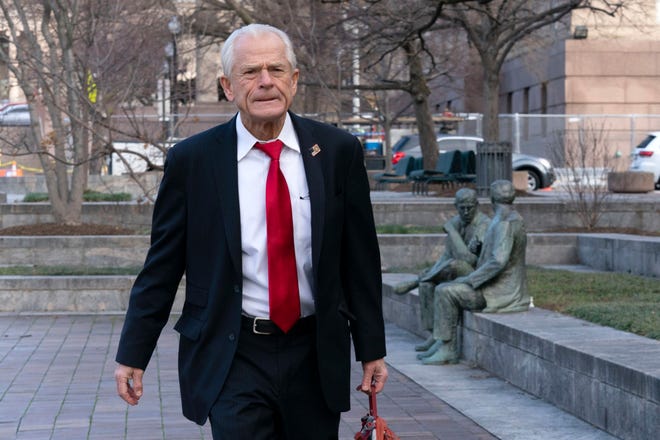[ad_1]
- The Justice Department argues Navarro not protected by executive privilege.
- Department also urges judge not to allow Navarro to make ‘mistaken’ argument during trial.
- Navarro has argued executive privilege shielded him from contempt of Congress charges.
WASHINGTON – The Justice Department said Tuesday that Peter Navarro, an aide to former President Donald Trump, has no blanket claim to executive privilege that would have prevented him from testifying or providing documents to the House committee that investigated the Capitol attack on Jan. 6, 2021.
Navarro, a former White House director of trade and manufacturing, faces two charges of contempt of Congress for defying a subpoena from the House panel.
On the eve of the trial in January, Trump formally invoked executive privilege to keep communications with Navarro confidential. U.S. District Judge Amit Mehta postponed the trial to hear more arguments about the dispute.
The Justice Department argued Navarro never documented the claim of executive privilege before he was charged. But even if he had, the committee sought to ask him about protests and speeches on Nov. 14, 2020, and about purported election fraud in a report he released, which fell outside his official duties protected by executive privilege.
“The Defendant argues that both executive privilege and testimonial immunity excuse his noncompliance with the Committee’s subpoena,” U.S. Attorney Matthew Graves said in the filing. “This is incorrect.”
Navarro has until April 4 to reply.
Here’s what we know about the case:
Why did House panel want to question Navarro?
The Jan. 6 committee sought to question Navarro because in his 2021 book “In Trump Time,” he described the scheme to delay certification of the 2020 election of President Joe Biden through a strategy called the “Green Bay Sweep.” Navarro said it was the “last, best chance to snatch a stolen election from the Democrats’ jaws of deceit.”
Navarro said in a later interview that Trump was “on board with the strategy,” according to the committee. He also produced a three-volume document called The Navarro Report about claims of purported election fraud. The panel subpoenaed him for documents about the plan and testimony.
But Navarro replied to the committee by email that Trump invoked executive privilege to keep their communications confidential. “Accordingly, my hands are tied,” Navarro wrote.
How does executive privilege fit in the case?
Navarro’s case could help define executive privilege and the ground rules for criminal prosecutions. The doctrine for keeping presidential communications confidential, to ensure candid advice, is being tested in other criminal investigations.
Former Vice President Mike Pence said he would fight a subpoena from special counsel Jack Smith, who is investigating Trump’s role in the Capitol attack. Trump had urged Pence to reject electors from seven states Biden won, but Pence refused.
More:Jan. 6 committee never got McCarthy, key Trump aides to testify. Here’s who they are.
In another claim of privilege, Rep. Scott Perry, R-Pa., argued at the D.C. Circuit Court of Appeals against federal authorities searching his cellphone that was seized last summer. Perry was a central figure in planning to overturn the 2020 election and introduced Trump to a candidate to install as acting attorney general, according to the House committee.
Perry’s lawyer, John Rowley, argued that his communications should fall under the Constitution’s speech and debate clause, which aims to protect a lawmaker’s speech from prosecution. But judges questioned such an open-ended claim for any conversations.
What is the Justice Department arguing?
The committee asked to subpoena Navarro by email Feb. 9, 2022. He replied three minutes later: “Yes. no counsel. Executive privilege.” On Aug. 17, 2022, Navarro sought to dismiss the indictment because federal criminal rules say “when a former president invokes Executive Privilege as to a senior presidential adviser, the adviser cannot thereafter be prosecuted.”
But federal courts upheld the House committee’s subpoena power in previous civil cases dealing with claims of executive privilege over documents. The D.C. Circuit Court of Appeals ruled that Biden’s refusal to invoke executive privilege outweighed Trump’s claim and the Supreme Court refused to hear the case.
More:House Jan. 6 panel recommends DOJ prosecute Trump on several charges. Which ones and why?
The Justice Department argued there is no blanket immunity from testifying or providing documents – witnesses must make the claim in response to specific questions.
“Arguably, no president, current or former would have the authority to make a categorical invocation of testimonial immunity over all the information sought by the Committee from the Defendant because most of the information the Committee sought did not concern matters that occurred in the course of the Defendant’s discharge of his governmental duties,’ Graves wrote in his filing. “No authority exists that suggests a witness could have absolute immunity from producing documents.”
The department also argued Navarro shouldn’t be allowed to claim executive privilege during the trial.
“The Defendant should not be permitted to testify about contrary and mistaken beliefs before the jury,” Graves wrote.
Who else has been charged with contempt?
The House recommended contempt charges against four people who defied subpoenas. But the Justice Department only charged two of them and didn’t explain its reason for not charging the others:
[ad_2]
Source link

